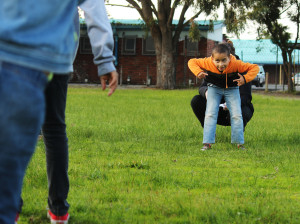 What games did you play when you were a child? Do you remember playing with other children from your family and community? Do you remember the fun you had and what you learnt without even realising it? And what songs or rhymes did you love to sing or say? Even as adults we often sing – perhaps you sing along to your favourite songs on the radio or you sing when you are in the bath!
What games did you play when you were a child? Do you remember playing with other children from your family and community? Do you remember the fun you had and what you learnt without even realising it? And what songs or rhymes did you love to sing or say? Even as adults we often sing – perhaps you sing along to your favourite songs on the radio or you sing when you are in the bath!
Play is the work of childhood. All children need plenty of opportunities to play because it feeds their imaginations and develops their problem-solving, social and language skills.
Why use songs, rhymes and games?
- Children learn most easily through play and having fun.
- Songs, rhymes and games develop children’s home language skills and are a natural way for them to learn a second language.
- They validate children’s knowledge and experiences and this builds self-esteem, which is so important for learning.
- When adults participate in songs and games with children, it builds a sense of trust and strengthens the bond between them.
- Children struggle to learn when they are anxious, under pressure or scared. Songs and games relax children.
How to use songs, rhymes and games
- Use body movements and actions that fit the words of the song or rhyme.
- Print or write up the words of the songs for children to read as they sing. Then point to the words as you sing or say them. You can do this even if the children cannot yet read or write because seeing written words being used will help them learn how we read.
- Use bilingual games, songs and rhymes to help children learn a second language. You can use Nal’ibali’s Banana Song as an example! Watch here.
- You can see an example of games being played at Kannemeyer Primary School reading club here.
Where to find songs and rhymes
- Teach children the songs and rhymes that you learnt as a child.
- Use songs everyone knows and change the words to reflect your children’s experiences.
- Make up your own songs or rhymes based on the stories you read.
- Ask children to teach you the songs and rhymes they know and let them make up their own songs and rhymes.
- Borrow illustrated books of rhymes from your library.

